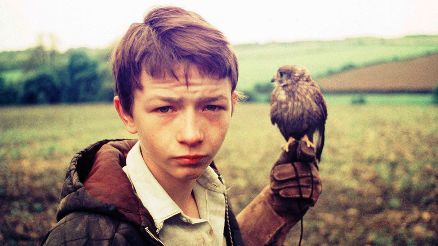
 A boy in an English mining town trains a falcon in his spare time, in Ken Loach’s 1970 working class drama.
A boy in an English mining town trains a falcon in his spare time, in Ken Loach’s 1970 working class drama.
Kes was a film, produced in 1970, that brought director Ken Loach to the world’s attention, marking a new beginning in the British realist tradition. It’s about a boy in a Yorkshire mining town named Billy, played by David Bradley, who is neglected by his overworked mother and mistreated by an older brother (played by Freddie Fletcher) who is already embittered by his dead-end life as a miner. Billy dreads going to the mines, but nothing in his environment or schooling has given him hope for much else. He’s bullied at school, gets into fights, and steals. But when he notices a falcon’s nest near his home, he studies falconry from a book, captures the bird, and gradually trains it.
In the working-class genre of British cinema, Loach went a few steps further than his predecessors a decade before, both in style (more documentary-like, including the use of non-professional actors) and content (more socially conscious and less inclined to sentimentality). Here he is relentless in his portrayal of the deadening effect of class on the consciousness of a child. Billy’s relationship with the falcon Kes, which in a more conventional film might act as a symbol of hope or transcendence, is here more of a simple counterpoint to the sense of everyday oppression. The picture is particularly masterful in its depiction of life at school. One scene where a group of boys lines up to receive a caning from the brutal, contemptuous headmaster, manages to be grimly amusing and appalling at the same time. A long sequence with a gym teacher (played by Brian Glover) behaving more childishly than his students in a football game, and then later cruelly punishing Billy for not showering, has a devastating power.
Billy’s interest in falconry is evidence that an initiative springing from within a child, as opposed to expectations imposed from without, offers a true alternative, a fact skillfully highlighted in a late scene between Billy and a superficially kind but indifferent guidance counselor. The counselor’s offering of various low-level career possibilities to the unresponsive boy is a low-key summing up of the entire film—it never occurs to Billy to mention his interest in falconry to this adult, probably because it seems to exist in a wholly separate realm.
Based on a novel by Barry Hines, the movie doesn’t try to “clean up” the heavy Yorkshire dialect, which is a big part of its authenticity. I would, however, recommend that American viewers use a closed-captioning or English subtitle feature when viewing the film on DVD, if possible.
Kes is a very moving story of innocence and powerlessness. Loach’s commitment to truth allows our insight, and whatever hope we may find, to exist only just outside the frame, as it were, in the compassion of his direct method. Without the burden of sentimentality, we are able to experience a deeper level of emotion. Ken Loach went on to create a body of work committed to portraying the neglected underclass of this world.

